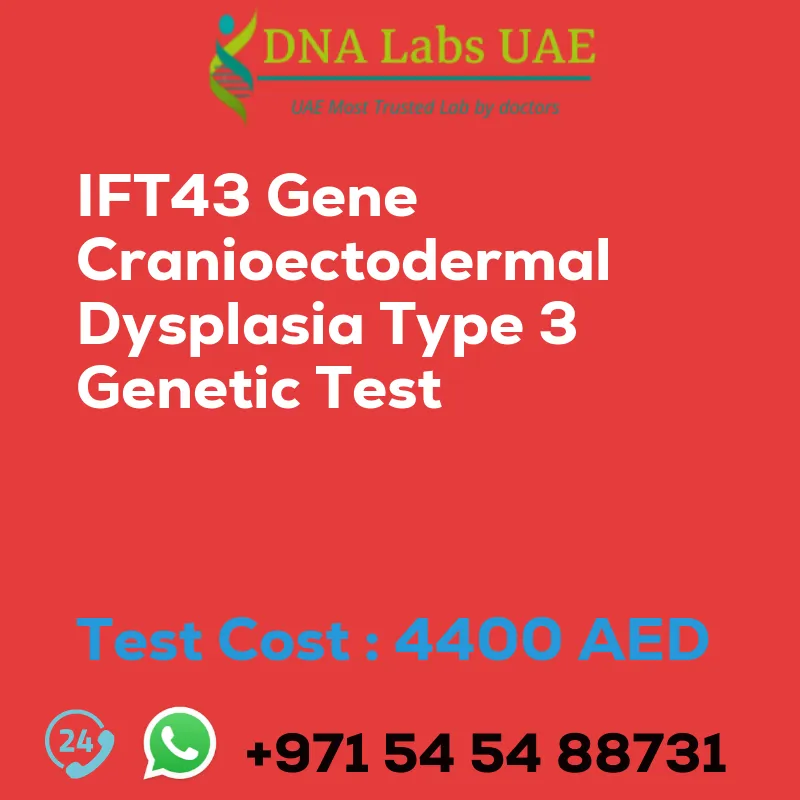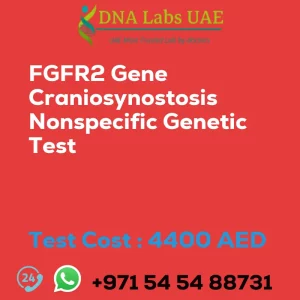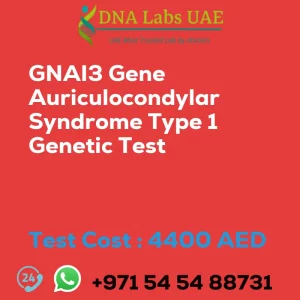IFT43 Gene Cranioectodermal dysplasia type 3 Genetic Test
Genetic testing plays a crucial role in diagnosing and managing various genetic disorders. One such disorder is cranioectodermal dysplasia type 3, which is associated with mutations in the IFT43 gene. This blog will provide detailed information about the IFT43 Gene Cranioectodermal dysplasia type 3 Genetic Test offered by DNA Labs UAE.
Test Details
The IFT43 gene is responsible for cranioectodermal dysplasia type 3, a rare genetic disorder characterized by abnormal development of craniofacial structures, ectodermal tissues, and the skeletal system. To diagnose this disorder, DNA Labs UAE offers the IFT43 Gene Cranioectodermal dysplasia type 3 Genetic Test.
Components and Price
The cost of the IFT43 Gene Cranioectodermal dysplasia type 3 Genetic Test is 4400.0 AED. The test can be conducted using a blood sample, extracted DNA, or even one drop of blood on an FTA card.
Report Delivery and Method
The report for the IFT43 Gene Cranioectodermal dysplasia type 3 Genetic Test is delivered within 3 to 4 weeks. The test is performed using NGS (Next-Generation Sequencing) technology, which allows for the analysis of multiple genes simultaneously, providing a comprehensive evaluation of an individual’s genetic makeup.
Test Type and Doctor
The IFT43 Gene Cranioectodermal dysplasia type 3 Genetic Test falls under the category of dysmorphology testing. It is recommended to consult with a pediatrician who specializes in genetics for this test.
Test Department and Pre Test Information
The IFT43 Gene Cranioectodermal dysplasia type 3 Genetic Test is conducted in the Genetics department. Before undergoing the test, it is important to provide the clinical history of the patient. Additionally, a genetic counseling session is conducted to draw a pedigree chart of family members affected by the disorder and the IFT43 gene.
Understanding NGS Genetic Testing
NGS genetic testing is a powerful method used to identify mutations or variants in genes associated with specific disorders. In the case of cranioectodermal dysplasia type 3, NGS genetic testing helps in identifying mutations or variants in the IFT43 gene. This information is crucial for accurate diagnosis, genetic counseling, and management of the condition.
During NGS testing, the DNA of an individual is sequenced and compared to a reference genome. Any variations or mutations in the targeted genes, including the IFT43 gene, are identified. This comprehensive analysis helps in confirming the presence of cranioectodermal dysplasia type 3.
Consultation and Conclusion
If you suspect that you or someone you know has cranioectodermal dysplasia type 3, it is important to consult with a healthcare professional or a genetic counselor. They can assess the symptoms, evaluate the need for genetic testing, and guide you through the process.
The IFT43 Gene Cranioectodermal dysplasia type 3 Genetic Test offered by DNA Labs UAE is a valuable tool for diagnosing and managing this rare genetic disorder. By understanding the genetic makeup of an individual, healthcare professionals can provide appropriate care and support to improve the quality of life for those affected by cranioectodermal dysplasia type 3.
| Test Name | IFT43 Gene Cranioectodermal dysplasia type 3 Genetic Test |
|---|---|
| Components | |
| Price | 4400.0 AED |
| Sample Condition | Blood or Extracted DNA or One drop Blood on FTA Card |
| Report Delivery | 3 to 4 Weeks |
| Method | NGS Technology |
| Test type | Dysmorphology |
| Doctor | Pediatrics |
| Test Department: | Genetics |
| Pre Test Information | Clinical History of Patient who is going for IFT43 Gene Cranioectodermal dysplasia type 3 NGS Genetic DNA Test. A Genetic Counselling session to draw a pedigree chart of family members affected with IFT43 Gene Cranioectodermal dysplasia type 3 NGS Genetic DNA Test gene IFT43 |
| Test Details |
The IFT43 gene is associated with cranioectodermal dysplasia type 3, which is a rare genetic disorder characterized by abnormal development of the craniofacial structures, ectodermal tissues (such as hair, teeth, and nails), and skeletal system. NGS (Next-Generation Sequencing) genetic testing is a method used to analyze multiple genes simultaneously, allowing for a comprehensive evaluation of an individual’s genetic makeup. In the case of cranioectodermal dysplasia type 3, NGS genetic testing can be used to identify mutations or variants in the IFT43 gene that may be responsible for the disorder. NGS testing involves sequencing the DNA of an individual, comparing it to a reference genome, and identifying any variations or mutations in the targeted genes. This can help diagnose cranioectodermal dysplasia type 3 and provide valuable information for genetic counseling and management of the condition. It is important to consult with a healthcare professional or a genetic counselor to determine if NGS genetic testing is appropriate for an individual suspected of having cranioectodermal dysplasia type 3. |








